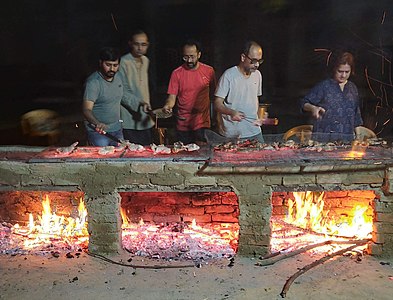Ashoke Sen
Ashoke Sen | |
|---|---|
Stanford Linear Accelerator Center | |
| Doctoral advisor | |
| Website | home |
Ashoke Sen
MIT and a distinguished professor at the Korea Institute for Advanced Study. His main area of work is string theory. He was among the first recipients of the Breakthrough Prize in Fundamental Physics "for opening the path to the realization that all string theories are different limits of the same underlying theory".[4]
Early life
He was born on 15 July 1956[5] in Kolkata, and is the elder son of Anil Kumar Sen, a former professor of physics at the Scottish Church College, Kolkata, and Gouri Sen, a homemaker.[6]
After completing his schooling from
Indian Institute of Technology Kanpur. During his undergraduate studies at Presidency, he was greatly inspired by the work and teaching of Amal Kumar Raychaudhuri. He did his doctoral work in physics at Stony Brook University
.
Career
Ashoke Sen made a number of major original contributions to the subject of
D-branes and made the famous Sen conjecture about open string tachyon condensation on such branes.[8] His description of rolling tachyons[9] has been influential in string cosmology. He has also co-authored many important papers on string field theory
.
In 1998, he won the fellowship of the
better source needed
]
Honors and awards
- ICTP Prize in 1989[11]
- Fellow of the Indian Academy of Sciences in 1991[5]
- S.S. Bhatnagar award in 1994
- TWAS Prize 1997[12]
- Fellow of the Royal Society 1998[2]
- Fellow of the Indian National Science Academy in 1996[13]
- Padma Shri in 2001[14]
- Infosys Prize in the Mathematical Sciences, 2009[15]
- Padma Bhushan in 2013[18]
- M.P. Birla Memorial Award in 2013
- Dirac Medal in 2014[19]
Gallery
-
Sen and Prof. Sumathi Rao with students at Harish-Chandra Research Institute, 2018.
-
Sen preparing barbecue chicken at Barbecue Festival (Harish-Chandra Research Institute, Feb 2019)
References
- ^ a b "Ashoke Sen | ICTS". www.icts.res.in. Retrieved 10 June 2023.
- ^ a b c Pulakkat, Hari (19 December 2013). "How many of us know about Breakthrough Prize winner, Ashoke Sen?". The Economic Times. Retrieved 4 September 2019.
- ^ a b "School of Physical Sciences". National Institute of Science Education and Research. Retrieved 4 September 2019.
- ^ a b "Breakthrough Prize - Fundamental Physics Breakthrough Prize Laureates - Ashoke Sen". breakthroughprize.org. Retrieved 17 June 2020.
- ^ a b "Fellow Profile – Sen, Prof. Ashoke". Indian Academy of Sciences. Bangalore: Indian Academy of Sciences. Retrieved 23 January 2016.
- ^ Miudur, G.S. (2 August 2012). "Physicist with pillow power". Retrieved 4 September 2019.
- S2CID 17534677.
- S2CID 14588486.
- S2CID 12023565.
- ^ "Department of Physics". Indian Institute of Science, Education & Research- Bhopal (IISER-Bhopal). Archived from the original on 22 September 2022. Retrieved 2 September 2020.
- ^ "ICTP Prize Winner 1989". Retrieved 4 September 2019.
- ^ "Prizes and Awards". The World Academy of Sciences. Retrieved 4 September 2019.
- ^ The Year Book 2014 // Indian National Science Academy, New Delhi.
- Ministry of Home Affairs, Government of India. Archived from the original(PDF) on 15 October 2015. Retrieved 21 July 2015.
- ^ "Infosys Prize - Laureates 2009 - Prof. K VijayRaghavan". www.infosys-science-foundation.com.
- ^ "New annual US$3 million Fundamental Physics Prize recognizes transformative advances in the field". Breakthrough Prize. 31 July 2012. Retrieved 4 September 2019.
- ^ "Indian scientist Ashoke Sen bags top physics honour". The Times of India. 2 August 2012. Retrieved 4 September 2019.
- ^ "Rajesh Khanna, Sridevi, Mary Kom, Rahul Dravid on Padma list". The Times of India. TNN. 26 January 2013. Archived from the original on 28 January 2013.
- ^ "ICTP - Dirac Medallists 2014". www.ictp.it.
External links
- Home page
- Ashoke Sen CV
- "Thomson Honours Leading Indian Scientists" Archived 12 March 2007 at the Wayback Machine
- The Hindu, Sunday, January 7, 2001: "Stringing together the ultimate law"[usurped]
- "Profile of Top 25 scientists in India". India Today. 11 September 2011. Retrieved 4 September 2019.
![]() Media related to Ashoke Sen (physicist) at Wikimedia Commons
Media related to Ashoke Sen (physicist) at Wikimedia Commons


